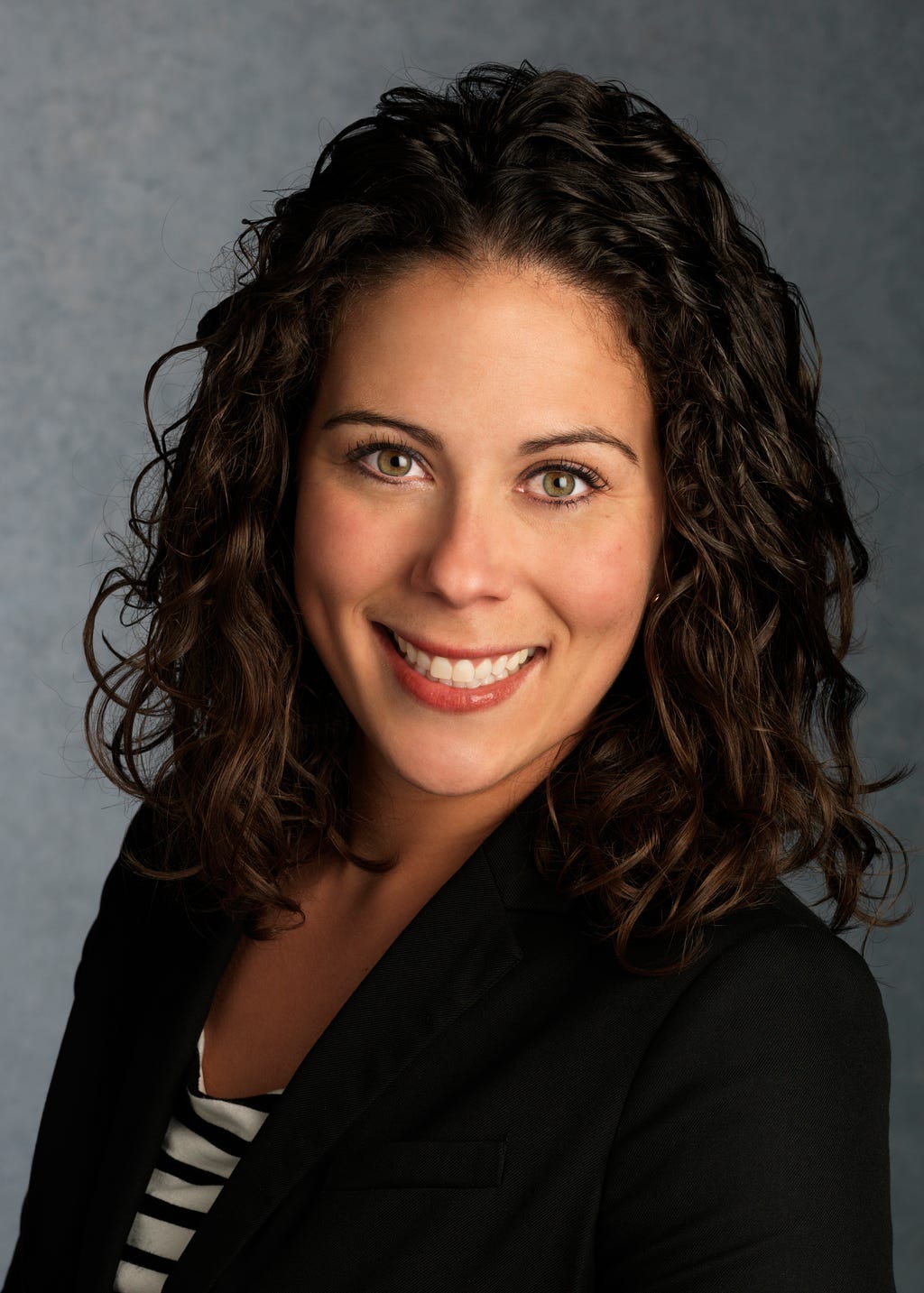
It actually DOES take a village, so it’s always a collaboration and, most important, that means it’s okay to delegate. Sometimes that’s hard to do, especially when you’re new to leadership. But that ultimately means that you give more people ownership and meaning, and you save some battery energy for yourself as well.
As part of my series about “individuals and organizations making an important social impact”, I had the pleasure of interviewing Kate Sommerfeld.
After joining ProMedica as the Corporate Director for Social Determinants of Health Institute, Kate was promoted to President of the institute in 2018, a position regarded as the first of its kind in the healthcare industry. The institute’s mission of focusing on non-clinical issues, such as safe housing, food access, financial stability, reliable transportation and other aspects that drive overall health, has led Kate to the forefront in overseeing ProMedica’s 10-year $50 million neighborhood revitalization. And her passion for improving the health and well-being of at-risk populations has landed Kate on Modern Health’s Top 25 Emerging Leaders of 2020, Toledo’s 2018 20 Under 40, and Becker’s 2018 Healthcare Rising Stars: 90 healthcare leaders under 40.
Thank you so much for joining us in this interview series! Can you tell us a story about what brought you to this specific career path?
My parents, who were foster parents, played a huge role in my career path. Because of them and my experience growing up, I always knew that I wanted to work with families and kids. I wanted to give opportunities for a better, healthier life to underserved communities. As someone who now has the position to provide support to individuals, families and communities, I feel extremely lucky to be personally connected to this work.
Can you share the most interesting story that happened to you since you began leading your company or organization?
In my line of work, I have the privilege of witnessing something amazing almost daily. Most recently, the stories that have been most impactful to me is how our organization is helping individuals, specifically single moms, find employment to support their families. One example in particular is a single mother who we were able to put through State Tested Nurse Aide (STNA) training. After her training, we were able to connect her to the right opportunity, which led to her being hired.
Can you share a story about the funniest mistake you made when you were first starting? Can you tell us what lesson you learned from that?
One story that sticks out to me is when I was working for a foundation. When you work for a foundation, one of the great parts of your role is being able to tell someone that their organization is receiving funding. But on the flip side, one of the worst parts about working at a foundation is that you also have to tell someone that they are not getting funding. Those meetings are very tough, and very tense. Right after the first time I had to deliver the bad news, I went to console the director of the organization who we had just told was not receiving funding. She, understandably, was not in the mood to be consoled by me. But while it was an awkward moment, it truly came from a place of love and empathy. So the biggest lesson there for me was, when you have to make tough decisions or deliver tough news, it’s really about staying true to your authentic self even if it feels awkward at the time. While some may not appreciate the gesture in the moment, they will likely come to appreciate that you made the effort to truly connect and empathize.
Can you describe how you or your organization is making a significant social impact?
Our mission at ProMedica’s National Social Determinants of Health Institute is to redefine what we view as health care as a country. We go beyond clinical care by looking at how factors outside of a doctor’s office or hospital can affect overall health and well-being. These factors, called social determinants of health, are essentially the conditions and environments in which individuals live, learn, work, play, etc. This could be anything from housing to transportation access, safety, isolation and more. When individuals come to us, instead of only asking what their symptoms are, we ask questions like, “Do you have a home?”, “Do you struggle with food insecurity?”, “Do you have purpose in your life?” and then connect patients to the resources that can help meet their needs. This type of holistic care not only has a huge impact on an individual and community level, but also long term impact in the sense of emergency department use and overall health care costs.
Can you tell us a story about a particular individual who was impacted or helped by your cause?
Yes, we recently had a patient who had screened positive for cancer and was getting care in our facilities. Normally, you would just treat them for the cancer, but our clinical team asked the patient about their food and housing situation. From that conversation, we found out that they were homeless and living in a shelter. So, we connected them to services that were able to find them a long-term apartment. The patient was able to complete treatment while being housed, which had a huge impact on their ability to be treated and recover. Thirty-six months later, they were able to open a bank account and maintain that stable environment.
Are there three things the community/society/politicians can do to help you address the root of the problem you are trying to solve?
- Broadly, one of the things we want to push through is leveraging lived experiences into how we care for individuals. Oftentimes, the health care industry or politicians look at the data and decide what’s right for the community or specific populations. At our organization, we want to not only look at the data, but also hear directly from the individuals we are trying to support. We want those who have experienced the struggles we’re trying to address to have a voice, provide their points of view and suggest solutions that will support them best.
- From a payment perspective, as a society we really need to start reimbursing individuals for social economic factors. The cancer patient above, for example. Rather than just reimburse for “traditional” medical expenses, we also need to make sure we are reimbursing individuals for stable housing, access to food, etc. That shift in thinking will, in the long term, help transform the way we look at health care.
- On an individual level, become involved in organizations to support this cause. For example, we launched the ProMedica Impact Fund, which calls for sustained and measurable change in our nation’s health care. And don’t think involvement is only monetary. Contributing your time and talents to these types of organizations can have immeasurable impact as well.
How do you define leadership? Can you explain what you mean or give an example?
I am very lucky to have a rock star team. Throughout my time in leadership roles, I’ve found that it’s not necessarily about having all the answers. It’s about casting the vision and creating the atmosphere for impact and innovation. Your job as a leader is to make sure you’re enabling a culture where your team can have the room and resources to do what they need to do. Empower them to excel.
What are your “five things I wish someone had told me when I first started” and why. Please share a story or example for each.
- Never let great get in the way of good. In life, and especially corporate life, change usually comes in increments. Always swing for the fences, but singles and doubles are also gifts and another successful step in what is usually a long journey.
- It actually DOES take a village, so it’s always a collaboration and, most important, that means it’s okay to delegate. Sometimes that’s hard to do, especially when you’re new to leadership. But that ultimately means that you give more people ownership and meaning, and you save some battery energy for yourself as well.
- Beware of the hothouse effect. Leadership can be insular and isolating if you only interact with other leaders. The conversation and the stress tend to echo and magnify. Get out into the community and organization, make sure you stay connected to the impact of the work. I try to get out into our homeless shelters and food banks to volunteer at least every month. It fills my bucket and roots me to the work.
- Always have fun. Start your meeting with stories and connection. It’s important to laugh. It helps to build relationships, and relationships are everything.
- Show up as your authentic self. As a new mom, I was one of the youngest on our executive team by almost 20 years. I vividly remember being in an all-day board meeting, needing very badly to pump. I stayed much of the meeting because I didn’t want to be different. The reality is that what differentiates us is what makes us add value to a team. Be true to who you are, regardless.
You are a person of enormous influence. If you could inspire a movement that would bring the most amount of good to the most people, what would that be? You never know what your idea can trigger. 🙂
Health is broader than what happens in a doctor’s office or hospital. I want to encourage people to think outside the traditional understanding of health care in our country, and to think of how we can support individuals and communities on a larger scale by looking at those nonclinical factors such as housing, food access and more.
Can you please give us your favorite “life lesson” quote? Can you share how that was relevant to you in your life?
“If you are too comfortable, it’s time to move on. Terrified of what’s next? You’re on the right track.” Susan Fales-Hill. We are only on this earth for a short time. You have to grow and stretch. Show up in a way that helps other people.
Is there a person in the world or in the US with whom you would like to have a private breakfast or lunch and why?
Maya Angelou. While she experienced much adversity, she refused to let it control her — instead she focused on nurturing her unquenchable love of life learning. Self-taught philosophy, literature, ethics, history. The common thread of her attitude and writing is hope — always hopeful. She spent so much of her life as a caged bird but never stopped singing, and she inspired others with her song.
Thank you for these really excellent insights, and we greatly appreciate the time you spent with this. We wish you continued success.
Social Impact Heroes: Why & How Kate Sommerfeld of ProMedica Is Helping To Change Our World was originally published in Authority Magazine on Medium, where people are continuing the conversation by highlighting and responding to this story.
